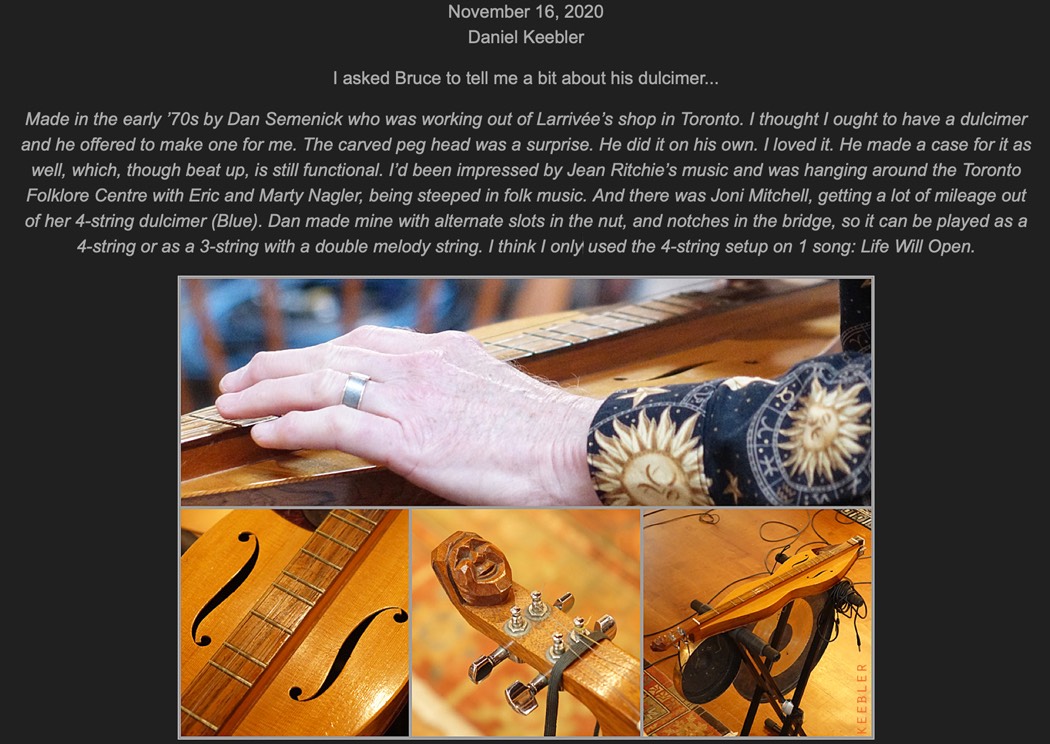
November 16, 2020
The Vinyl Supper
Foy Vance
Episode 10
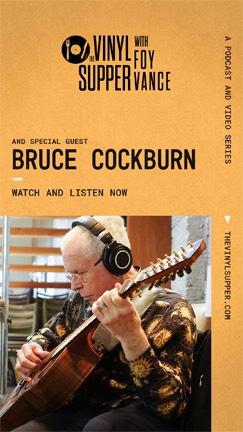
WATCH THE INTERVIEW on YouTube, or at the Vinyl Supper website.
On a very special 10th episode, Foy gets to speak with one of his idols: Bruce Cockburn. Bruce’s first album came out fifty years ago, and here he is on episode 10 of The Vinyl Supper with Foy Vance. His eponymous album was released on April 7th 1970, including classic hits “Going to the Country” and “Musical Friends.” In the past fifty years, he’s released 34 albums and played around the world.
Foy and Bruce bond over songwriting and what ‘the new normal’ has meant for them. Bruce calls back to an All-American favorite food, chicken and waffles, and rewinds over memories with All-American favorite musicians, Elvis and Little Richard. The two get serious with talks of the recent unrest in the states, and Bruce has some words of wisdom: “looters are not the creators of chaos.” They discuss the difference between condoning, condemning, and understanding.
In his own words, Bruce says of the last fifty years of recording: “I can only shake my head and mutter a word of thanks for all of it. Even if I’d been a planner by nature, I doubt I could have predicted how things have gone. And they’re still going!” Going they are indeed: Bruce’s songs have been covered by Jimmy Buffet, kd Lang, Barenaked Ladies, Jerry Garcia, Judy Collins, Chet Atkins, and many more.
This episode was recorded in July 2020.
November 6, 2020
Amplify
Bruce Cockburn: 50 Years of Songs
by David McPherson
“Strikes across the frontier and strikes for higher wage/ Planet lurches to the right as ideologies engage/ Suddenly it’s repression, moratorium on rights/ What did they think the politics of panic would invite?/ Person in the street shrugs ‘Security comes first’/ But the trouble with normal is it always gets worse/ The trouble with normal is it always gets worse.”—Bruce Cockburn “The Trouble with Normal”
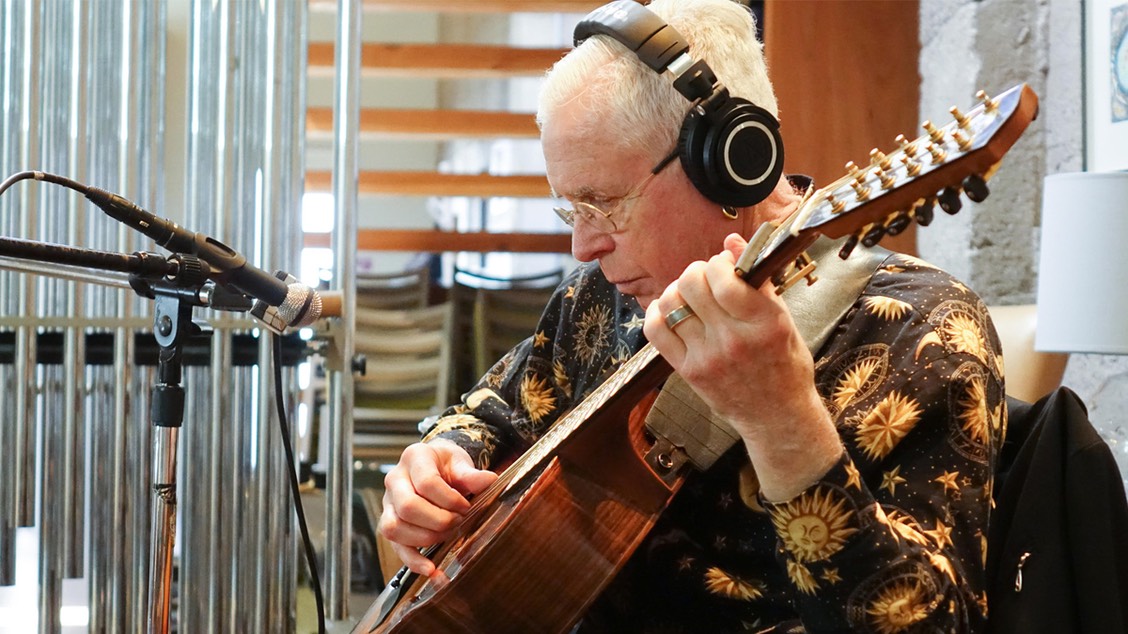
Finding the right words to express the zeitgeist has never been a problem for Bruce Cockburn. Take the lyrics from the chorus of his 1983 hit cited above. Normal is what everyone pines to discover in a year marked by fear and uncertainty. Let’s hope when normalcy returns, it’s not a harbinger of the next wave of bad news. For more than 50 years, the iconic Canadian songwriter has been carefully crafting words and phrases into storied songs—some more politically charged than others. Over the past 20 years, I’ve been fortunate to share a half dozen conversations with the Canadian Songwriting Hall of Famer. Getting a good quote is never an issue. Finding a way to weave as many of his wise words as possible into my finished feature is the challenge.
Like everyone in the music industry, 2020 has been a challenging year for Bruce. His plans for 2020 are on hold. Shows cancelled, rebooked, and rescheduled until whenever it’s safe to play live again. This year was supposed to be a celebration of a milestone—50 years as a songwriter and the golden anniversary of his self-titled debut on the label founded by his manager Bernie Finkelstein. Instead, Cockburn released a limited edition vinyl box set via True North Records and participated in several multi-artist streamed shows.
“I’m not nostalgically inclined by nature, but it’s interesting to say I’ve been doing this for 50 years,” he reflects. “50 years is 50 years of being beaten by the weather, metaphoric, and actual, but it still feels like a milestone. I’m happy True North did this 50th box set. More than anything, it finally gives vinyl versions of a couple of records I think are the best I’ve ever done.”
Asked about the secret to his 50-year business relationship—and friendship—with Cockburn, Finkelstein says: “I guess we are just two people that want to stay together. It’s that simple. I joke that since Bruce and I never had a formal management contract, he doesn’t know when it is over! We just are on the same track on what needs to be done. We’ve been right more than wrong and here we still are.”
The 50th anniversary vinyl package was limited to 750 copies personally signed by Cockburn. No surprise, it sold out within the first month. True North—A 50th Anniversary Box Set includes the songwriter’s debut Bruce Cockburn; and a pair of records that have never appeared before on vinyl: The Charity of Night (1997); and the JUNO-winning Breakfast in New Orleans, Dinner In Timbuktu (1999). Colin Linden, Cockburn’s long-time friend, producer, and frequent bandmate, re-mastered the records. Linden loved Cockburn as a fan long before the pair became friends. His brother had a copy of the songwriter’s debut and Linden recalls seeing the guitar virtuoso perform for the first time on his 11th birthday: April 16, 1971. Linden produced both The Charity of Night and Breakfast in New Orleans, Dinner in Timbuktu; the Grammy-winning artist feels these albums are two of Cockburn’s best. He remembers well that night 24 years ago when Bruce showed up at his Toronto apartment with The Charity of Night demos. Linden says listening to sketches for songs like “Pacing the Cage” for the first time was “life-changing.” “It was just one brilliant song after another,” Linden says today from his Nashville, Tenn. home. “After Bruce left that night, I asked if I could do some overdubs on the demos. My wife [Janice] and I had some ideas for additional parts and textures. I made a rough mixtape of the songs with our overdubs and Bruce really liked them. That is how I got the call to produce that record.”
After laying down the bulk of the tracks at Toronto’s Reaction Studios, Linden and Cockburn travelled to the San Francisco Bay area to do some additional recording at Bob Weir’s studio where they also added vocals from Bonnie Raitt and Maria Muldaur. New Orleans was the final stop where Calgary-born John Whynot mixed the record at Kingsway—Daniel Lanois’ studio. “Mixing in Lanois’ studio changed everything for me in terms of how I’ve made records for the last 25 years,” says Linden, “just the whole aesthetic of how Dan creates a recording environment. You can see the fruits of that in my home studio today. Making that record was a life-changing experience.”
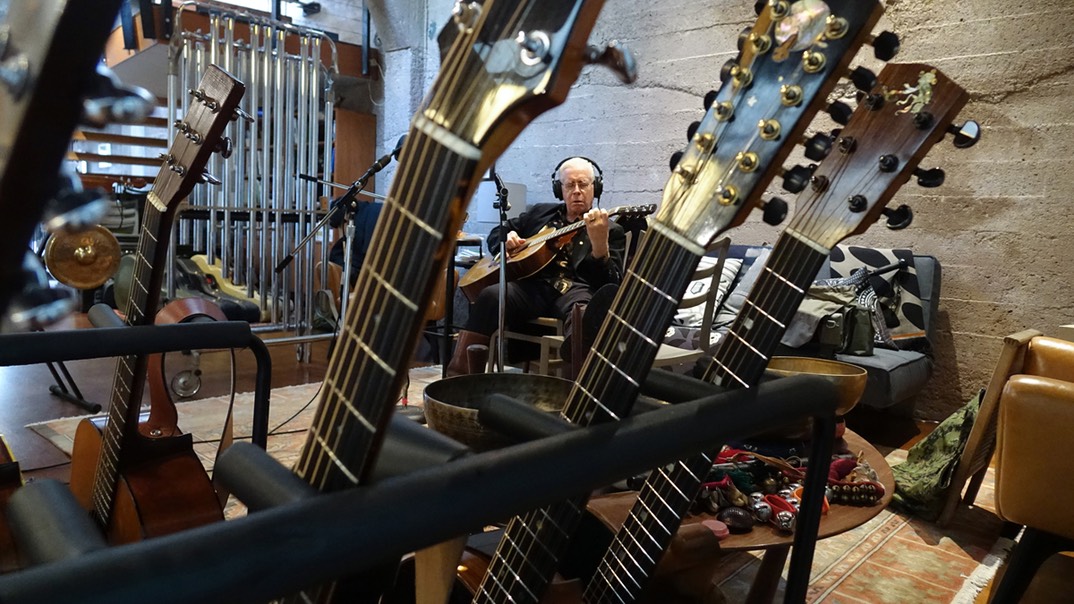
Catching up with Cockburn in the middle of a pandemic finds him as contemplative as ever, happy to chat about his career, his approach to songwriting, and life in 2020. When we chat, the 75-year-old is enjoying some family time in the college town of Arcata, California with his wife and eight-year-old daughter. The family of three is in the midst of a road trip in an RV, cruising up the Pacific Coast, and visiting with friends—at a social distance of course. After three months shut-in at home in San Francisco, Cockburn needed a respite from the monotony of domesticity.
“I was expecting to be doing a whole bunch of shows,” he says. “It was unfortunate to have to let go of that. It’s hard to stay motivated at times with no gigs. And, I can’t get together with others to get inspired, so that is also a bit odd, but contrary to my expectations I’ve been very busy, helping my daughter with online classes and getting lunches made.”
In an election year, for a songwriter who has never shied away from making his opinion known on political matters, does he feel the need to capture his mood in a new song or two? “I feel like there is so much blather right now, I don’t need to add to it,” Cockburn says. “It’s not that all of what people are saying is not meaningful, but there are just so many voices clamouring I don’t have much to add to that conversation. I have opinions and feelings that will eventually show up, but at this point, what am I going to say about Trump that hasn’t been said and who needs it anyway?”
After 50 years of writing songs, I ask if his approach has changed. “The process is not so different,” he explains, “it’s just more deliberate now. I didn’t know what I was doing when I started writing songs. I didn’t understand how it all worked. I wait around for a good idea and write down anything that is useful: images, and other bits and pieces as they come. Eventually, some idea will show up that triggers an actual song. What is different now is I pay more attention to the details and I’m fussier, but it still takes an emotional trigger or a phrase of some sort to get it going. Sometimes I have an idea that sounds good and then realize I said that 40 years ago.”
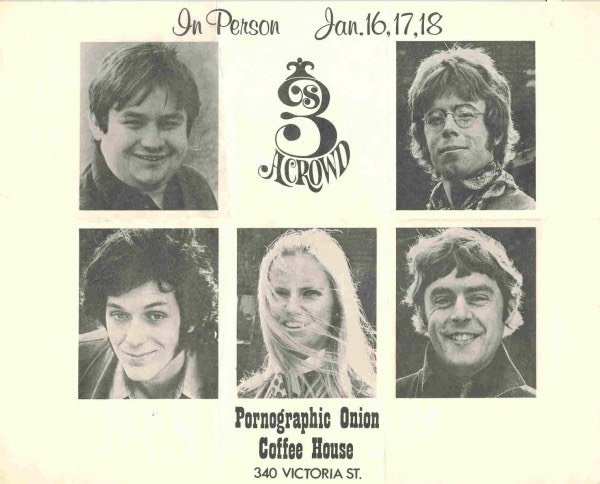
Cockburn’s songwriting journey began more than five decades ago in Ottawa, Ontario. After a couple of years studying at Boston’s Berklee School of Music, majoring in composition, he dropped out of school in 1965 and returned to his hometown to start a band (The Children). Finkelstein recalls seeing a young Cockburn as part of this short-lived group when they opened for The Lovin’ Spoonful at a show in Kingston, Ontario. “The Children were interesting and good, but they left no great impression on me one way or the other. Bruce was just a member of the band.”
Once Bruce left The Children to pursue a solo career, and started to pen his own material, is when he really left an impression on Finkelstein—enough of an impression that he signed him to a record deal, the first for True North Records. The memorable gig occurred at The Pornographic Onion, a coffeehouse at Ryerson University run by Eugene Martynec. Martynec (who went on to produce Bruce’s first 10 records) heard his friend was starting a record label and told him he had an artist called Bruce Cockburn that Finkelstein had to hear. “I didn’t realize how good he was until after I signed him,” recalls Finkelstein, who sold True North Records in 2007, but still manages Cockburn. “He played ‘Going to the Country’ and my ears lit up. I thought that could be a hit. Within one month I signed Bruce and that December we went into Eastern Sound and made his debut album.”
Thirty-four albums later, 13 JUNO Awards, an induction into the Canadian Music Hall of Fame and the Canadian Songwriters Hall of Fame, as well as the Governor General’s Performing Arts Award, and an Officer of the Order of Canada, Cockburn could easily rest. Alas, putting down their notebook and ignoring the muse is not part of an artist’s DNA.
Until a vaccine is found and it’s safe for a return to the new normal, whatever it looks like, Cockburn, like all artists, is waiting. He’s hopeful to hit the road and play selections from his half-century catalogue of songs to live audiences again sometime in 2021.
“There is reason to be hopeful, but right now it is a game of wait and see,” he concludes. “If people would just get more responsible – and take the steps necessary to get past this pandemic. If it follows the pattern of the 1918 Spanish Flu, it will run its course and eventually fade away and we will all forget about it until the next one comes along – and there will be a next one I’m sure. It’s really important that we as a species and culture use the stresses and openings that have been provided at this moment to move ourselves forward.”
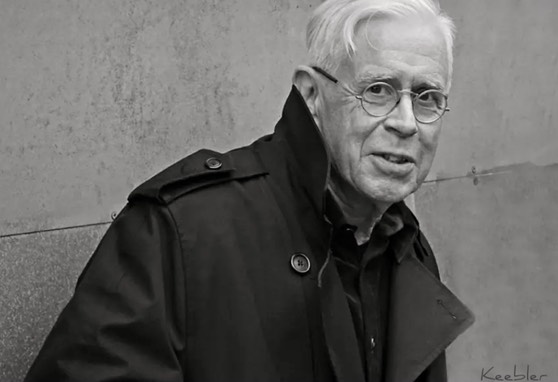
October 27, 2020
Mark Dunn interviewed Bruce in August 2019. It was published in the winter 2020 edition of a journal called Contemporary Verse 2. You will find Mark’s interview here.
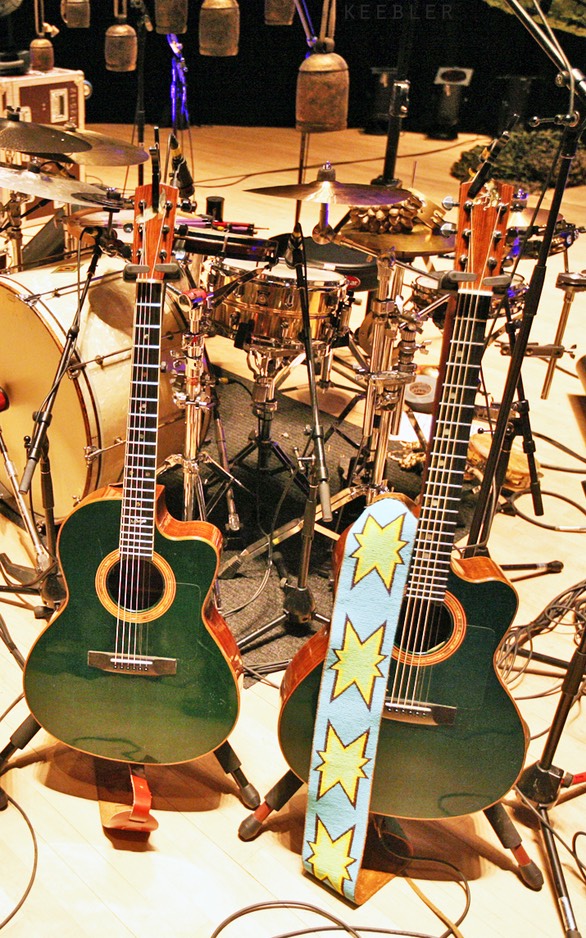
October 22, 2020
Daniel Keebler
I asked Bruce about the differences between his two Manzer six-string guitars. He told me...
The one with the beaded strap was made for me by Linda in the late’ 80s. It’s slightly deeper than her usual pattern, to get more bottom end, and the neck is a hair wider than average, to make it easier to finger pick. The inlay is unique to that guitar, being drawn from ancient Mayan bas relief, by way of a calendar full of those images somebody gave me. The fingerboard inlay is actually made up of numbers that correspond to the frets. The peg head has a firefly motif (though to the modern eye it looks more like a masturbating monkey). The other guitar was made a bit later for a fan, an aspiring songwriter, who wanted one “just like“ mine. It’s the standard depth, has a narrower neck which is kinder to my old hands, and has a nice rendering of a red tailed hawk on the peg head. It’s owner developed some kind of shoulder issue and had to quit playing, so the guitar went back to Linda, and thence to me.
They each have a similar mic/pickup combination.
And there you have it.
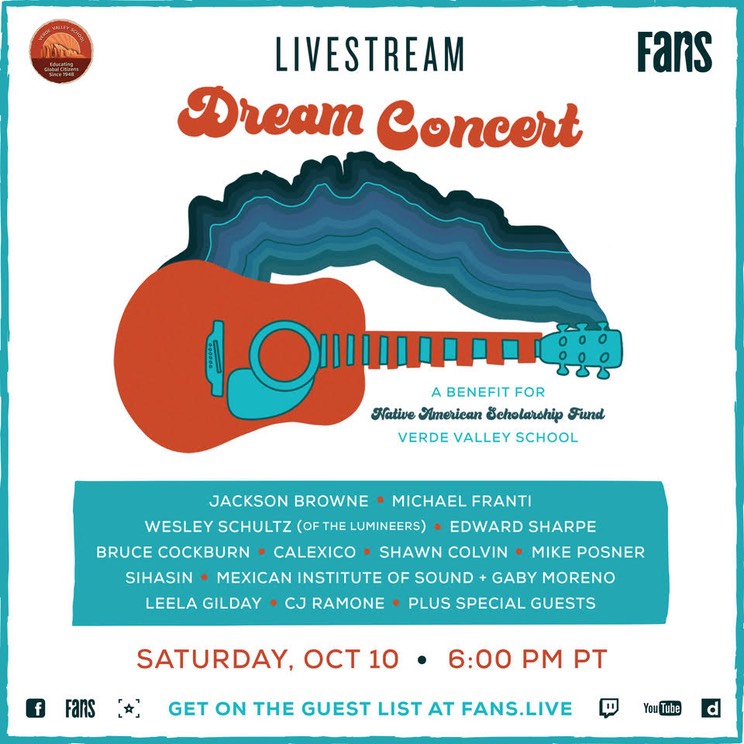
September 29, 2020
Bernie Finkelstein
Live Stream Benefit Concert
Well after an absence of many years Jackson Browne has revived the Native American Scholarship Fund benefit concert for the Verde Valley School in Arizona. I can't remember how many times Bruce played those wonderful concerts but it was several and each one was very special for a great cause and always with great artists and audiences. Be great if you could join us on October 10 for what Jackson has called the Dream Concert.
(Note: This concert occured during Covid. Each artist was performing remotely via the internet. Bruce played "Lovers In A Dangerous Time" from his home. He also joined in, along with other performers, on Jackson Browne's song, "Take It Easy.” -Daniel Keebler)
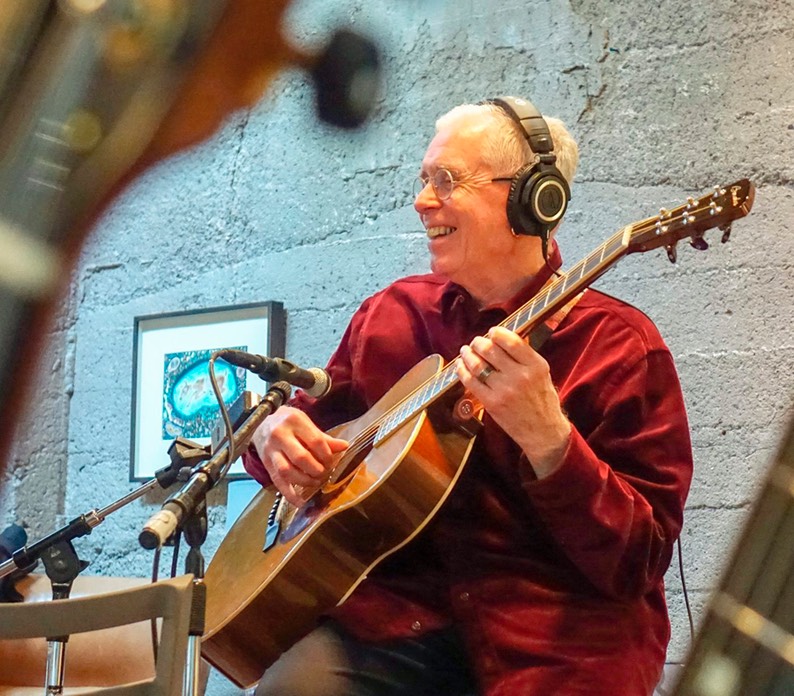
September 23, 2020
Americana Highways
Key to the Highway: Bruce Cockburn
by Melissa Clarke
Fans always clamor to learn more about their favorite, most beloved musicians and those who travel with them. There’s such an allure to the road, with its serendipity, inevitable surprises, and sometimes unexpected discomforts. This interview series is a set of questions we are asking some of our favorite roots rock Americana artists to get to know more about them and what they’ve learned and experienced on the road. We are sure they have key insights to share and stories to tell. Here’s one from Bruce Cockburn:
Americana Highways: How do you like your coffee or other morning wake-up beverage?
Bruce Cockburn: Strong and black
AH: What’s the most interesting or strangest motel/hotel or place you have stayed (while on the road?)
BC: Hotels…hmmm… Was it the fleabag in Skopje where the bed springs sagged to the floor? Or the “hotel” attached to a club outside of Manchester with torn curtains and a crust of forty years of rock band habitation? Or the guest house in Nepal where the cow tried to come in and get warm and the guy who was out of his mind with altitude sickness tried to convince the innkeeper’s twelve-year-old daughter to go outside with him and help him take a leak? Maybe the New York joint with the beautiful Art Deco lobby and the rundown room where the roaches and I were compelled to listen to the neighbour’s TV blasting a sports event. When I knocked on their door the sound was abruptly cut off. The guy who opened up was very tall and dark haired, wearing a tense expression and a shoulder holster. Past him I could see two other large fellows, similarly equipped, and on the couch a small older man. I pointed out that the game was pretty loud in my room and would they mind terribly turning it down. “Oh. Sure. Sorry!” he said, and as the door swung shut I could hear “It’s ok. It’s just the guy next door saying the TV is too loud.” After that the game came on again, softer, and I could make out their conversation through the paper thin wall; three plainclothes cops guarding what appeared to be a mob witness.
AH: If one CD is stuck in the player in the van for the entire tour, what do you hope it is? And why?
BC: Tough question. The duration of the tour might be a factor. Something soothing on the ears and the brain — Arvo Part maybe, or Pablo Casals’ rendering of the Bach cello suites. Or maybe Bo Diddley…
AH: What’s one personal item you must have with you on your road trip?
BC: A good knife.
AH: What is your relationship with food? How do you handle this on the road, and what’s your favorite dish on the road, (or restaurant, and what do you order there)?
BC: Unless you’re in Italy, where it’s almost impossible to get a bad meal, food on tour is pretty much catch as catch can. There’s a lot of late night pizza and questionable Chinese. That said, once in a while there’s a great meal. That has happened in Edmonton, Venice, New York, Toronto, Grants Pass OR, somebody’s kitchen in Winnipeg…
AH: If you could pause your life for a few weeks and spend some time living in a place you only have passed through, which would you choose, and why?
BC: I’ve passed through a lot of places. None of them felt like home. Many of them have seemed to invite further exploration though. I’m generally drawn to the high and dry — the Rockies, the Four Corners region of the southwestern US. That said, there are some pretty great coastlines in the world — western Newfoundland, islands like Martinique, Maui, the wild coast of Cornwall. To the high and dry, add windswept. What really makes or breaks a place though are the people in it.
AH: What quote or piece of advice have you gotten from someone on the road that has really stuck with you?
BC: Live fast — die young! Oops! Blew that.
September 21, 2020
The Star
Don’t try to give Bruce Cockburn a rocket launcher. It’s been tried — three times
by Nick Krewen
For a few years in the 1980s, it seems that everyone was trying to hand Bruce Cockburn his very own rocket launcher.
Rarely has such an angry song about the atrocities of defenceless wartime human slaughter been so perfectly articulated in song as in the Ottawa-born Cockburn’s 1984 hit “If I Had A Rocket Launcher.”
But it seems as though a few people misinterpreted the lyrics.
“There were actually three incidents,” says a chuckling Cockburn, on the line from the San Francisco residence he occupies with his wife and daughter.
Cockburn, who celebrates half a century as a recording artist with the Sept. 25 release of the vinyl-only, five-disc collection “True North — a 50th Anniversary Box Set,” recalls an incident in Afghanistan after he had just finished performing the song to Canadian troops stationed in Kandahar.
“General (Jonathan) Vance” — currently Canada’s chief of defence staff — “appeared at my shoulder with the rocket launcher and handed it to me,” he recalls.
“It was loaded — it was one of those little single-use anti-tank rocket things, but there I am, cradling this thing in my arms and there was this picture in the paper — I’ve got this enormous grin and it looks like Christmas.
“But that was the best of those moments.”
Cockburn, 75, remembers a second incident, following a concert in the southern U.S. around the time of the song’s release, when a radio station sent some employees to join him for a pre-show photo opportunity.
“They’d brought a rocket launcher that they’d rented from the National Guard — and they wanted to pose with it. They thought it was cute,” he remembers. “At this point, the song was fresh and I found it really offensive. I told them so. They didn’t get it. The song doesn’t say, ‘I wish I had a Rocket launcher. It says, ‘if!’”
But the scariest occasion occurred after a show in Bellingham, Wash. “We were crossing over the border into Vancouver after the show and while I was in the parking lot, a guy says, ‘I have a gift for you but you have to come to my car to get it.’
“The guy — over six feet tall, very muscular, very short hair — pops his trunk and has three rocket launchers in there. He wanted to give me one.”
Cockburn thanked him and politely declined. “If I had said, ‘yes,’ there would have been a checkpoint somewhere. I think it was a trap. He had ‘cop’ written all over him.”
These are just some of the adventures the noted troubadour and respected guitarist has enjoyed since 1970, when he helped launch the True North Records label with the self-titled “Bruce Cockburn.”
Over the course of 26 studio albums, four live recordings, three compilations and the 2014 box set “Rumours of Glory,” the 13-time Juno Award winner has expounded upon the folk idiom to include blues, roots, rock, pop and — for want of a better word — Americana. Cockburn, a member of the Order of Canada and the Canadian Music Hall of Fame, has also expanded his topical horizons, writing hundreds of songs that are as intellectually stimulating and thoughtful as they are emotional, informed by a Christian faith that is neither intrusive nor sermonizing.
His songs range from mystical to introspective to philosophical to romantic to political to playful to sober, from roaming idyllic moods with “Wondering Where The Lions Are” or expressing environmental concern with “Radium Rain.” He’s tackled political effrontery in “Call it Democracy” and raised awareness of inhumane treatment by government regimes in “Nicaragua,” his observations recorded from first-hand visits to war-torn territories.
“He’s a fearless explorer,” notes Nicholas Jennings, author and music historian who has provided liner notes for Cockburn’s entire remastered catalogue, including the new box set.
September 20, 2020
FYI Music News
New Bruce Cockburn Box Set Timed To True North Records Anniversary
by Nick Krewen
The True North 50th Anniversary Box Set has a dual purpose.
As much as this vinyl-exclusive three-album collection of Bruce Cockburn, The Charity Of Night and Breakfast In New Orleans…Dinner In Timbuktu commemorates the five decades that the Ottawa-born singer, songwriter and master guitarist has been a recording artist, it also serves as a celebration of 50 years of True North Records, the label started in 1969 by Cockburn’s manager, impresario Bernie Finkelstein.
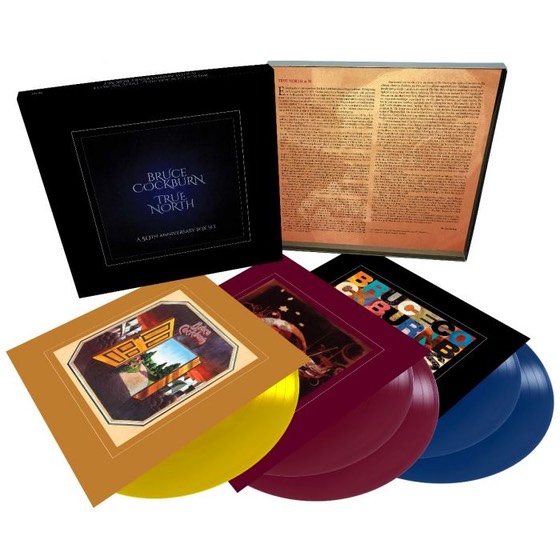
Remastered by Colin Linden and limited to 750 multi-coloured 5LP sets personally signed by Cockburn, manufactured by Toronto-based Microforum Vinyl Record Pressing, and available exclusively via Linus Entertainment, The True North 50th Anniversary Box Set also honours the loyal professional relationship between the singer/songwriter and his manager.
And the secret sauce to the 50-year-plus management relationship between Bernie Finkelstein and his star client?
“First off, I’m a real admirer of his music – all 34 albums of it,” Finkelstein replied in an interview. “There are 350 to 500 songs out there and I’m probably one of the only people alive that knows them all.
“We’ve done quite well, which helps. The fact that I know all his music wouldn’t mean anything if, you know, if we were down in the dumps all the time.
“Bruce is also very, very easy to work with,” Finkelstein continues. “This is going to sound very simple – and perhaps very simplistic – but if I didn’t call him, I’m not sure he’d ever call me, because he’s not really a big-time careerist.
“It can be very frustrating because Bruce could be even bigger than he is now if he wanted to be. He’s quite content to continue to do things the way that he does it.”
From the artist’s standpoint, Bruce Cockburn says Finkelstein possesses a number of laudable traits.
“He’s an interesting character on so many levels,” said Cockburn recently from his San Francisco haunt. “I so admire him. I admire his gift for strategizing. I admire his love of the music, which is deep and genuine.
“He’s a business guy and he thinks like a business guy, but in contrast to other certain people that I’ve run into over the years, he has a really deep understanding of music and very good ears. Although he and I may disagree over this or that or the other thing, when it comes down to it, Bernie’s appreciation of the song is as informed and as sensitive as anybody’s could be.
“That had a lot to do with it – and he was doing what he was doing for the money. He could have made more money doing it for someone else,’” Cockburn laughs. “So, I appreciate the fact that he’s put in all that time and loyalty – I think we’ve been loyal to each other. I’m sure that’s part of it.”
With such a longstanding and mutually rewarding relationship, you’d think there’d be frequent backyard BBQs or frequent socializing.
Surprisingly, Finkelstein says that’s not the case.
“We don’t share much socially,” he explains. “We don’t hang out a lot – especially with him in San Francisco and me here, we never did. I think all of those things add up to a relationship that doesn’t get too complicated by other complex things.”
But Finkelstein says he and Cockburn do have certain commonalities.
"We both like getting things done and making sure that things are the best that we can do, all the time. In Bruce’s songs, he’s often referring to things like eclipses and event horizons and things like that that he just drops into songs. We both have a real interest in that kind of thing.”
Obviously though, the relationship is important enough to both men that when Finkelstein sold True North, he and Cockburn maintained their handshake management association.
“When I sold True North in late 2007 [to Geoff Kulawick, Harvey Glatt and Michael Pilon], I decided that I was going to mostly retire from the music business, but I thought that Bruce and myself had some unfinished business to do,” he notes.
“So, we stayed on and it’s been another 12 or 13 years since I did that. Things keep rolling along. It’s almost taken a pandemic to make us stop.”
Distributed physically by Cadence/Fontana North, designed by Juno award winner A Man Called Wrycraft, and featuring new liner notes from author and music historian Nicholas Jennings, The True North 50th Anniversary Box Set is available for $199.00 (CDN) through Linus and north of $200 on Amazon.
The album flats were shipped to San Francisco for Cockburn to sign at home, then shipped back over the border for assembly. The handsome box set also features a new True North logo designed by Brooke Kulawick and all copies are individually numbered.
As far as the True North label history is concerned, Finkelstein is happy he provided a creative home to help establish acts like Murray McLauchlan, Barney Bentall, Rough Trade and Blackie and The Rodeo Kings - and on the management side, in partnership with Bernie Fiedler – Dan Hill.
“I miss that old label. I’m very, very proud of the work I did with Murray McLauchlan, Rough Trade and all the rest,” said Finkelstein. “We had our fair share of hits, but the one thing we never lost sight of was high quality, not to chase the commercial end of the business.”
In terms of the inclusion of Bruce Cockburn, The Charity of Night and Breakfast in New Orleans…Dinner In Timbuktu as box set choices, Cockburn says it makes sense.
“Of course, you’re going to put the first album on the 50th-anniversary set,” Cockburn notes. “ But the other ones were chosen consciously because they represent stuff I’ve done in a way that’s as good as it gets. Those albums are, within themselves, very complete expressions of the time and set of situations. And they work very well musically.
“Once in a while I’ll hear a track from an older album and think,’ Wow, geez, that was pretty good!!’” he laughs. “It surprises me, not because I forget, but because the path becomes a big wash. When something pops out of that wash that is noteworthy, it catches my attention.”
Cockburn may be contemplating a new album…or not.
“I’m not much of a planner – I never have been, “ he admits. “This year was supposed to be filled with 50th anniversary touring, which of course, it isn’t. We’ll see what of that we’ll be able to apply to next year, but we had that instrumental album that came out a year ago that was going to be one of the things celebrated in that 50th-anniversary tour.
“So, I hadn’t thought much about a next album, really, as I still had the intention and desire of one day doing an album of other people’s songs. I was sort of thinking, well, maybe now’s the time for that. But I’ve got three new songs and now I’m thinking, maybe it isn’t yet time for that.”
August 2020
Goldmine Magazine
Another Legendary Bruce
by Ray Chelstowski
Across 34 albums, Bruce Cockburn has made music that is often difficult to define.
A friend of mine recently made an interesting observation about the musician Bruce Cockburn. He noted how rare it was to find any photo over the years of Cockburn hanging backstage, performing alongside, or standing in the company of any fellow famous musician(s) from the same era. Almost every photo you find is the same — Bruce and his guitar alone in front of a microphone. It’s a metaphor for how he has so singularly lived his life. Bruce Cockburn is true to himself, avoids trends, and has always put forward material that is marked by a profound sense of daring and duty.
Across 34 albums, Bruce Cockburn has made music that is often difficult to define. At times he sits squarely within the folk world. Then he migrates a bit to jazz and rock. And for some time now he has found a way to color his music with spirituality, a nod to his reborn Christianity. A world-class acoustic guitar player, he is known for having “the hardest-working right thumb in show business.” His abilities here have helped rank his talent at par with guitar legends like Bill Frisell, Django Reinhardt and Mississippi John Hurt. All of this will be celebrated in a forthcoming 50th Anniversary Box Set, where three previously released records have been remastered for vinyl. These records consist of his 1970 self-titled debut, a very spare and introspective piece of music, joined by two albums from the early ’90s that have never been released before on vinyl: The Charity of Night and Breakfast in New Orleans, Dinner in Timbuktu. Each album has been re-mastered by Bruce’s long-time producer Colin Linden, and is pressed on colored vinyl. The five 180-gram discs are contained in original artwork sleeves adapted from the original designs by renowned graphic designer Michael Wrycraft, and reside with an individually numbered box signed personally by Cockburn.
This unique approach to celebrating his anniversary is just another demonstration of how Bruce Cockburn has always done it his own way. A large tour in support of this release was to begin in May. But like most concerts at the moment, it has been pushed off until the fall. We caught up with Bruce to talk about the release, his creative process, and where he thinks we will end up on the other side of this world pandemic. His responses were often framed with an endearing sense of humility defined by regular laughter, and offered rare insights into what life has been like for the last 50 years as one of the few real bona fide troubadours.
GOLDMINE: You have always been politically/socially active and ahead of the curve. Where do you think things will go on the other side of this pandemic?
BRUCE COCKBURN: Well, it’s hard to predict exactly where it’s going to go. I don’t think that the quality of life in the world is going to improve because of this. One element of that has to do with democracy and who gets to have power and under what circumstances they get to exercise that power. That was already being eroded in this country anyway. Now I think that the threat of finding ourselves in some kind of authoritarian state is very real.
GM: In moments like these what is your approach to writing? Is the intent to make people feel better?
BC: Well, “connect” is more meaningful than “better.” Of course it’s nice to try and make people feel good, but that’s not the only way in which I want to touch people. For me, I’ve never operated from a particular stance, other than an artist trying to determine what’s going on and sharing it with people. So when I write about the stuff that people consider “political,” it comes about in exactly the same way as a love song or any other song. It’s not like I have taken a position and want to expound upon it. For me, it has to be organic. I’m not going around looking for issues to write about.
GM: This is an unusual way to celebrate this kind of milestone. Most 50th box sets span an entire career. This only focusses on three albums. Why?
BC: It came about because we wanted to do vinyl. The first album was an obvious choice because it was released 50 years ago. But with the other two it was interesting to put out something that had not been on vinyl before. I think they are among the best albums that I have made, and it just seemed appealing to put the focus on those records. If I happen to have a 75th anniversary, we can have a different mix of things. (laughs) But I didn’t want to do a chronological “best-of,” because that would have been an obvious thing to do — that made it less appealing to me. These two albums from the ’90s are pretty much representative of a lot of what I do.
GM: They were remastered by your longtime producer Colin Linden. What kind of direction did you give him? Were you trying to sonically connect them at all?
BC: Yes, Colin oversaw the mastering. They sound great. The mastering that was done makes them sound better than they ever have. For me it’s not important to make them match together in some way because they are in a box set. They match each other because it’s me! (laughs) The first album is separated by a long period from those other albums. It sounds different, but it stands up really well. When I listen back to my previous work, and I don’t spend a lot of time doing that, there’s the same sense of standing on the brink of some sort of threshold between the physical and spiritual world that pervades all of my stuff. So in a way that’s kind of the unifying factor. But I don’t think we needed to go out of our way to do anything concrete with the sound.
In terms of making them contemporary, the ’90s albums are already in that ballpark. We are pretty much dealing with the same technological parameters now that we were dealing with then. But they are bigger and richer because of the remastering. As for the debut, the vinyl sounds way better than the CD, and it’s not just an aesthetic choice between the two. It’s just that the mastering that was done for the initial CD release wasn’t very good. It was done in an era when CDs were new. So it just sounds 100 percent better than the CD ever did.
GM: You are also promoting last year’s release Crowing Ignites. There your acoustic playing is as strong as ever. How has it evolved over the years?
BC: Well, it’s shifted a little. Evolved? I guess I’d like to think it has. (laughs) Every now and then I hear some old thing that’s got stuff on it that I forgot about, and it makes me think that I haven’t really expanded that much. When I listen to some of the popular stuff from the ’70s — like the stuff on Dancing in the Dragon’s Jaws — there are things that I would do differently. But I don’t know that I’m a better player now. I’ve learned some other things since then, of course. But for every step forward that I’ve taken there’s the deterioration factor that comes into play, too. In general I’m no worse off.
GM: Why does it seem that Canada is so much more welcoming of acoustic music than the U.S.? Here we confine it to coffee houses and church basements.
BC: When I think of the American songwriters that I really appreciate, I think of Lucinda Williams, Tom Waits and Ani DiFranco. Guitar was the thing in the era that I came up in — everyone wanted to play folk music. We were very disdainful of people who played electric guitar unless they were Muddy Waters or Jimi Hendrix. It was just kind of the shape of things at the time. I was also always a jazz fan, so I had a great appreciation for the use of electric guitars as a jazz instrument. The road by which we arrived at songwriting was influenced so much by everyone from Woody Guthrie through Pete Seeger and Bob Dylan — more that than by the electric stuff. But we were also big Beatles fans, and big Rolling Stones fans so we played acoustic versions of those songs, too.
There are differences between Canadian music and American music, even in this very globalized time we’re in right now. Canada would never produce a Tom Waits. It would now because Tom Waits has already arrived and evolved. But before that I don’t think that he could have come out of Canada. At the same time, the states never produced a “Leonard Cohen” or a “Joni Mitchell.” But you can’t take this too far. We all grew up listening to American music. America gave the world rock and roll.
GM: How does your faith influence your songwriting?
BC: It’s complicated. It doesn’t when it comes to an individual song, because for me writing a song consists of getting a good enough idea, running with it and trying to wrestle it in to something. It’s not affected by outside concerns. I’m aware that being labeled anything limits you to the people who are attracted to that label, and creates a barrier between you and people who don’t relate to it. So if I’m called a “political singer,” I don’t like it, and if I’m called a “Christian singer,” I don’t like it, either-even if both are sort of true. I don’t want to only make music for people who identify themselves as Christians. I even resisted the label of “folk singer” for a long time, too, because folk singers were people like Pete Seeger, or they played bluegrass, and that wasn’t me. When I made the album Night Vision, it was in reaction to having been over-identified in the media with this sort of pastoral romanticism that a certain part of the public was going around with. I didn’t like being typecast like that. So I decided to make an “urban” record. It was a reaction to the sense of being pinned down. All of a sudden people were coming to the shows who wanted to whistle and stomp, which was shocking to me, because I had grown up in the coffee house atmosphere where you were supposed to be quiet and reverent toward whoever was onstage.
GM: You have always seemed to transcend trends or musical fads. You have also said that you aren’t a planner, that you take things as they come.
BC: It’s the only thing that I know how to do. It’s fun to learn other people’s songs now and then. When we were having live church services, I’d go and sit in with the church band and get to play electric guitar, which was fun and it felt good. But as far as the core of what I do, I don’t have any choice. This is how I see the world and this is how I understand how to make songs out of that. So that’s what I’m stuck with.
GM: 1984’s Stealing Fire album sleeve includes locations after each song. Is this where they were created?
BC: It’s where they were started, not always where they were finished. The content of a song doesn’t always have to do with a place. But I’ve done that on all of the albums since the beginning. I just sort of adopted the habit from poets that I was fond of reading from when I was young. Sometimes it makes no difference at all where you wrote a song, but with other songs it does. I think an audience’s perception of a song like “Nicaragua,” for instance, is impacted when they know that it was actually written there. Or another example is “Waiting for a Miracle,” where it means something slightly different, or the meaning is expanded if you put it in that context.
GM: You’ve covered a lot of musical ground, including soundtracks. How did you become involved with the children’s show Franklin?
BC: They were interested in having me do a theme song for this show. It was in development and I was aware of the books, marginally. I had never done anything quite like that. In the end, it wasn’t as much fun as I thought it might be, because it was kind of like writing a jingle. There was so much back and forth between me and the producers of the show over the use of this word versus that. I’m happy that I haven’t had to make a career of that sort of thing.
GM: Your music has been covered by many well-known talents. Has any version surprised you?
BC: So many people have done my songs in interesting ways. The most is Michael Occhipinti’s jazz version of a bunch of my songs. He put out an album that is all instrumental. It’s his take on those songs, and he really broke them down and reshuffled the deck in a very interesting way. So it’s fun for me to listen to that.
GM: You celebrate a milestone birthday this year: 75 years. What do you hope to achieve/accomplish in your new year?
BC: The hope is that I’ll be able to do some live gigs. Recording songs is interesting and useful as is making videos of them now from my room at home. But it’s not the same as sharing the experience of being in a place with people. That’s when the songs really come alive.
July 21, 2020
From Bernie Finkelstein
Many years ago in the late 60's and early 70's I used to go to Passim in Cambridge Boston, one of the great "folk" clubs in North America and one of the oldest as well, with a storied history. I would usually be there with Bruce Cockburn and Murray McLauchlan and later on with Stephen Fearing and Dan Hill. In any case like all clubs they are shut down but hoping to open as soon as possible. They contacted us about using Bruce Cockburn's "Wondering Where The Lions Are" as part of their fundraising efforts to support local musicians and we were more that happy to contribute the song. Here's what Passim had to say:
Passim Emergency Artist Relief (PEAR) Fund
Thanks to all who have contributed to our Passim Emergency Artist Relief (PEAR) fund which has provided much-needed financial relief to musicians during the Coronavirus crisis. $130,000 has been raised to date, and grants totaling $115,000 have been distributed to 240 artists. This has been a labor of love for all of us at Passim, and we appreciate your generosity.
To celebrate the reopening of the PEAR fund, we had a special show live from Club Passim! Featuring a live set from Hank Wonder, updates on the PEAR fund from managing director Matt Smith, and a debut of a Bruce Cockburn music video made for the PEAR fund by many local musicians. Watch special Bruce Cockburn video.
July 13, 2020
Excerpted from "The 25 Best Albums of 1980"
Paste Magazine
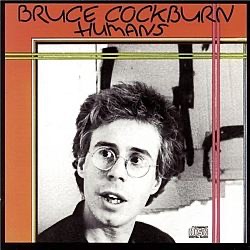
14. Bruce Cockburn: Humans
Few songwriters are as keen observers of humanity as Canada’s Bruce Cockburn, and he’s never been better than he is here, in the wake of a failed marriage and a move to inner-city Toronto. Here his writing began to get more political and outward-looking without losing the spiritual underpinnings and openness that made him unique. He compares humans to cattle in “Grim Travelers,” rattling off the problems of capitalism, imperialism and industrialism in verse after verse, and that’s just track one. And yet, in “Rumours of Glory,” he celebrates what humanity can be, “shining like gold but better.” It’s an optimistic album that pulls no punches on the struggles we face, struggles that haven’t changed all that much in 40 years and which Cockburn is still struggling against today. —Josh Jackson
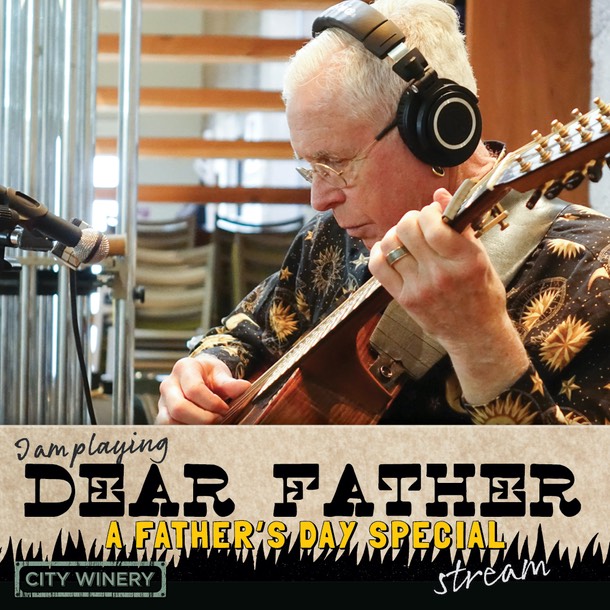
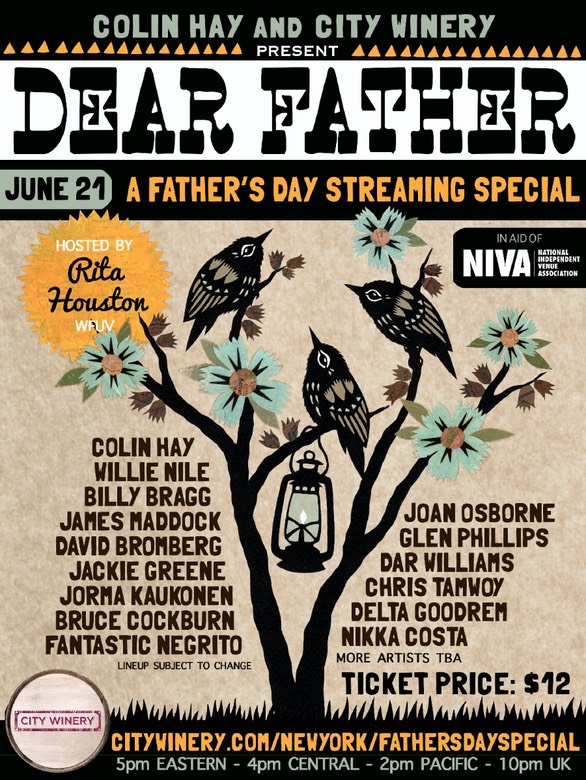
June 9, 2020
City Winery
Inspired by his heartfelt song, Dear Father, Colin Hay & City Winery present a multi-artist broadcast to celebrate Father’s Day on Sunday, June 21st beginning at 5PM Eastern Time.
The singer-songwriter and former Men at Work frontman has partnered with City Winery to curate a lineup of old and new friends and City Winery favorites including Billy Bragg, Bruce Cockburn, Dar Williams, Fantastic Negrito, Nikka Costa, Glen Phillips, Joan Osborne, Jorma Kaukonen and more. Hay also included two fellow Australian artists: singer-songwriter Delta Goodrem and Aboriginal guitar virtuoso Chris Tamwoy. Radio legend and WFUV host, Rita Houston, will serve as the streaming event’s emcee.
May 28, 2020
Ridgefield Press
Bruce Cockburn discusses new music and his inspirations
by Mike Horyczun
Canadian singer-songwriter and guitarist Bruce Cockburn released his first album 50 years ago, in April 1970. Thirty-four albums after the self-titled “Bruce Cockburn” disc, the celebrated musician has released an all-instrumental recording this year, “Crowing Ignites,” on the label he’s been with from the start, True North. Cockburn’s accolades include 13 Juno Awards (Canada’s equivalent to the Grammys), and induction into the Canadian Music Hall of Fame and the Canadian Songwriters Hall of Fame. He’s received eight honorary doctorates, and his memoirs “Rumours of Glory” was published in 2014. Cockburn’s interest in activist issues and causes has taken him around the world, and he’s been involved in such organizations as Amnesty International, Doctors Without Borders, and Friends of the Earth. His performance at the Fairfield Theater Company was originally planned for May, but was rescheduled for Nov. 4, due to the COVID-19 outbreak. Cockburn recently took time out to talk about his musical career.
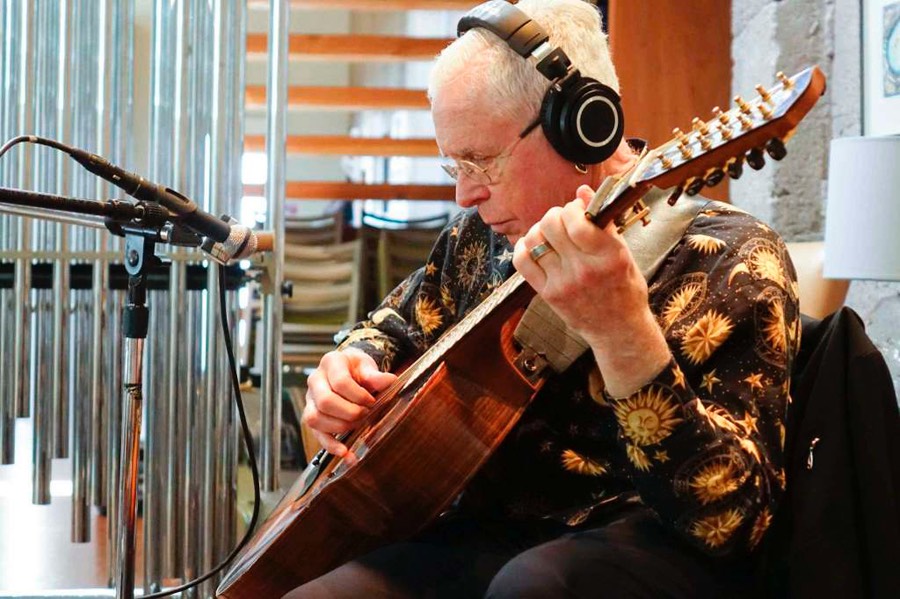
Mike Horyczun: When you’re on tour, how do you choose what songs to perform from this enormous body of work you’ve accumulated over five decades? Do you ever go back and listen to your early material?
Bruce Cockburn: Nobody wants to hear a show of nothing but new songs. There are the obvious ones that people have become attached to, but around that, I’ll go back and listen to the old material. Every now and then, I’ll stumble across a song that I’d forgotten about that might be worth learning and doing.
MH: How do you know when it’s time for a new album? Your latest, for example, is an all-instrumental recording.
BC: I generally just wait until I have enough material. The instrumental albums are a little different. The ideas for the pieces come out of jamming, basically, stumbling on something that feels like it could be developed into a bigger entity.
MH: Who are some of the guitar players that you admire?
BC: For a while I thought I wanted to be a jazz player, but I never really developed the chops or the ability to play two-five chords. But the influence remained and was strong. So from that quarter, there was Wes Montgomery and Gabor Zsabo, they’d be the two biggest ones, but legions of others, too. From the folk side of things, the biggest single influence was probably Mississippi John Hurt, and Mance Lipscomb, those kinds of country folk blues people. I listened to Ralph Towner. Pat Metheny is really good. I mean, there’s so many beautiful players.
MH: Who were some of the songwriters who influenced you?
BC: I was more influenced by writers, by printed word writers, than by songwriters. But certainly in the beginning, Bob Dylan was a huge influence. Dylan, John Lennon, Mick Jagger, lyricists who selected things that made songwriting come alive instead of just ‘Moon in June’ rhymes over standard tune changes. When I heard Dylan and that kind of generation of songwriter, I thought, yeah, maybe I want to do that too.
MH: How important is it for you to write about things that you’ve experienced?
BC: The writing process is always triggered by accident. I want to write about what’s around me, because that’s what I can think of to write about. I’m not good at coming up with teen love songs. Hopefully, the intention is to go around with a mental state that’s receptive to noticing what’s around, visual images, little bits of this and that, a snippet of conversation or whatever. Sometimes it’s really just noticing what’s around, and I try to put that in my songs.
MH: You live in San Francisco now, but when you’re in Canada, are you recognized for your music?
BC: It never was like tabloid material. But it was more of an issue when there were lots of videos out in the ’80s and through into the ’90s, big time. But even then, it wasn’t that bad. Once I was riding my bike down the street in Toronto, and somebody yelled out from the sidewalk, ‘I hate your music.’ Which I thought was kind of funny.
MH: Are there any goals you want to achieve at this point in your career?
BC: I’d like to survive long enough to make another album, which is about the only goal I’ve ever had. I’m not a goal person. I want to be good at what I do. That’s a goal. But it’s ephemeral. There’s no set of goalposts for that. It’s an everyday thing, right? You just try to not screw it up.
May 27, 2020
Roots Music Canada
A Salute to Bruce Cockburn on His 75th birthday
by Paul Corby
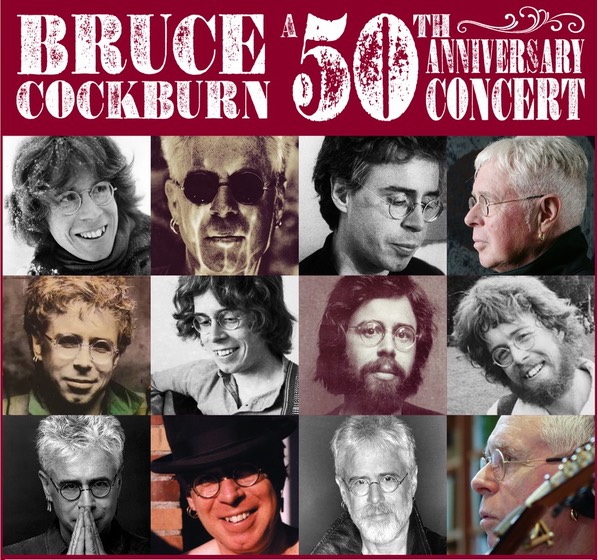
Today, as Bruce Cockburn reaches his 75th year, we can rejoice that he is still a stealer of fire, dancing his sunwheel dance in the falling dark of the dragon’s jaws. Roots Music Canada joins the rest of the world in celebrating his birthday, his music, his Junos, his doctorates, his investiture into the Order of Canada, his inductions into numerous musical Halls of Fame, his redemptive presence as a cosmic troubadour in Samuel R. Delany’s Dhalgren & The Shack by William P. Young, his performances on Saturday Night Live and at Pete Seeger’s birthday party, and his perilous witness, from the front lines of fear, at scenes of political violence around the globe.
Examine his talents. How much faceting can one diamond sustain? Lyrical master of specifically Canadian imagery, startlingly complex guitar explorer, bold mystic with Christian / Taoist / Buddhist / Sufi sleeves proudly spread, one of the original bilingual folk singers (ses textes ont été imprimés en français depuis l’époque de Trudeau senior), international peace-seeker, singer of both delicacy and urgency, shy public figure, punky Gemini, outspoken political critic and beacon, muscular ecologist, memoirist (Rumours Of Glory, 2014), gentleman feminist, and member of the all-star Canadian chorus, the Northern Lights, that rose up to roar out the crucial ”Let’s show ‘em Canada still cares!” line on the African famine relief anthem “Tears Are Not Enough.”
Bruce is waiting out this current deterioration of normal at home in San Francisco, “quite a lot busier than what used to be normal,” he reported, “(fathering), listening and reading: Fernando Pessoa’s novel The Book of Disquiet, William Gibson’s Agency, and poetry by Charles Bukowski, Joan Logghe and Wislawa Szymborska. For music, it’s pretty random. Recent listens include YouTube videos of David Russell’s stunning guitar playing as well as various performances by Voces8, Charles Mingus’ Tijuana Moods (an old favorite), the Rolling Stones’ Exile on Main Street, and Schoenberg’s Verklarte Nacht.”
In honour of this birthday, one of Bruce’s first musical friends who celebrated his own 75th in March, Sneezy Waters, recalled the beginning stages of his journey, saying “When I failed Grade 12 (from too much folly) my parents thought it would be a good idea to switch schools and buckle down. So at Nepean H.S. I ran into Bruce. He told me he played guitar, so I brought my Martin to school one day, and after school we went over to his house to jam. He brought out his guitar, which was a big Gibson hollow-body, just like Wes Montgomery played, and a lovely Ampeg jazz amp. He played so well but wasn’t the least [bit] boastful. He also loved Grant Green’s playing. We really had a good time and arranged many more jams.
“We eventually formed a band called The Children, along with my friends Nev Wells, Sandy Crawley and Chris Anderson. He played some keyboards for us and also played a 12-string, along with a Telecaster.
He was writing back then and encouraging the rest of us to write songs.
The rest, for both of us, is history.”
Fellow musician Ian Tamblyn, who worked with him on 2008’s Dancing Alone: The Songs of William Hawkins, remarked on Bruce’s “composure and openness” in the studio. He also had the honour, in 2014, of presenting Bruce with an honorary Doctor of Laws degree at Carlton University for his work in environmental, First Nations and social causes. In his presentation, Ian noted that “Bruce has had three overriding themes in his work: his great spiritual search, his dedicated call for social justice in the world, and his articulation of the collision of human relationships in these dangerous times.” He continued, “Bruce Cockburn has been both bold and courageous, whether it be in his work with Lloyd Axworthy to end the use of land mines, his environmental work with David Suzuki and Greenpeace, his work on behalf of the Unitarian Service, or his demands for democratic and environmental rights in Guatemala, Nicaragua, Mozambique or Mali.”
His outstanding personal qualities have kept him rooted in long-lasting friendships. Publicist Jane Harbury, who has been buddies with him since their days together at Toronto’s fabled Riverboat, respects him for being always “funny, smart and gracious.” She elaborated: “He doesn’t change on a personal level. He has an ability to make people want to love him. And he remembers everything.” She recalled him best, “coming in the back door of the club in a fluffy old hat with his big dog Aroo.”
Album designer Michael Wrycraft, who has designed the last nine of Bruce’s album covers, revealed that, “although he comes across as serious, Bruce is actually very light-hearted. Once you get past his professional presence, you find out he has a great laugh.” Their creative collaboration in bringing the unique visuals that accompany every new record together is consistently stress-free (with the exception of the altered American cover of You’ve Never Seen Everything, “which the record company thought looked like speed metal, or the devil.”). Of Bruce’s part in the process, Michael confided, “He plants a germ, a tiny seed of an idea, usually drawn from the album title; and after extensive chat, I come back with the work, and he says “That’s great!” Bruce’s loyalty to Michael’s vision has now stretched over 21 years. Manager Bernie Finkelstein has guided his career for over 50 years now, based upon a handshake.
Michael Reinhart is a composer/singer-songwriter and visual artist who has released five albums, the most recent being eCHO. He lives and works in both Montréal, QC and Edmonton, AB. Recently he’s been creating several new instrumental guitar pieces. He has been a Cockburn fan since his teens. “I loved that on those seminal albums, with so many instrumentals featured, above all I could hear the rich wood tone of the guitar, moreso than the metal of the strings, an analogue sound I still aspire to myself. I’ve never been much interested in doing cover versions, but among the few that I have attempted, ‘Foxglove’ was one that, despite the initial frustrations and physical pain involved, was invaluable to my finding my own way, my own style, my own sound.”
On behalf of all of his friends and fans at Roots Music Canada, we would like to say “Steady on Mr. C., and well done.”
May 4, 2020
Bruce Cockburn Announces
True North - A 50th Anniversary Box Set
Limited Edition Vinyl Set Arrives September 25th, 2020
PRE-ORDER HERE
TORONTO, ON, May 4, 2020 -- To be active and relevant in music for 50 years is a significant achievement for any individual recording artist. The same can be said for any independent record label. To achieve this milestone together as an artist and label team without interruption, has to be one of the most extraordinarily rare events in music.
To celebrate this milestone, Bruce Cockburn and True North Records have produced True North - A 50th Anniversary Box Set, a Limited Edition vinyl box set containing three of Bruce’s most significant recordings. The first album where it all started, the self-titled debut Bruce Cockburn along with two albums that have never before been released on vinyl; The Charity of Night and Breakfast in New Orleans, Dinner in Timbuktu. Each album has been re-mastered by Bruce’s long-time producer Colin Linden, and is pressed on coloured vinyl. The five-180 gram discs are contained in original artwork sleeves adapted from the original designs by the acclaimed graphic designer Michael Wrycraft, and housed in an individually numbered box signed personally by the artist. There will be only a limited initial pressing.
Bruce Cockburn was the first artist signed to True North Records, the tenacious independent label founded by Bruce’s manager Bernie Finkelstein and first operated from a Yorkville Avenue phone booth. Bruce’s debut self titled album was the label’s first album release on April 7, 1970, produced by Eugene Martynec, with the catalog number TN1. Fifty years on, Bruce Cockburn still records for True North Records, which released his 34th album “Crowing Ignites” in late 2019.
Bruce says, “In 1969, when I was feeling the need to record an album of the songs I’d been writing, I had no concept of what that might lead to. In some organic way it felt like it was time. The future wasn’t really an issue. It still isn’t. For each of us, there’s a future or there isn’t.
“But looking back over the arc of 50 years of recording, performing, and travel, not to mention relationships and personal challenges,” he continued, “I can only shake my head and mutter a word of thanks for all of it.”
Cockburn concluded: “Even if I’d been a planner by nature, I doubt I could have predicted how things have gone… and they’re still going!”
Cockburn has also scheduled fall tour dates celebrating the 50th Anniversary Additional updates and ticket information can be found through the official Bruce Cockburn website and the complete list of tour dates is below.
Although Mr. Finkelstein sold True North Records to entrepreneurs Geoff Kulawick, Harvey Glatt and Michael Pilon in 2007, True North continues to be a vital independent label signing and releasing records by Bruce alongside many of Canada’s leading singer-songwriters and musicians including Buffy Sainte-Marie, Murray McLauchlan, Matt Andersen, Colin James, Sass Jordan, Sue Foley, Natalie MacMaster and Jimmy Rankin.
Bruce Cockburn: True North - A 50th Anniversary Box Set
TND750 - Bruce Cockburn (LP) | A Charity of Night (2LP) | Breakfast In New Orleans, Dinner in Timbuktu (2LP) - 5 x 180 Gram Colored Vinyl Discs original artwork sleeves.
May 1, 2020
Toronro Globe & Mail
Singer-songwriter Bruce Cockburn on the challenge of writing in reaction to a crisis
by Brad Wheeler
In Between the Acts, The Globe and Mail takes a look at how artists manage their time before and after a creative endeavour.
At home with his family in San Francisco, the rock troubadour and guitarist Bruce Cockburn isn’t in songwriter mode. Among other things, he’s helping his young daughter with tele-schooling. “She puts on her little headset and gets on the computer,” Cockburn told The Globe and Mail recently. “But somebody has to get her to the computer on time and make sure everything is working right.”
With his 50th-anniversary tour postponed because of the COVID-19 lockdown, we asked the Ottawa-born writer of Lovers in a Dangerous Time about the challenge of writing in reaction to a crisis.
In his words
I think back to 9/11. Initially I felt like nothing I could say would contribute anything useful. Eventually Put It in Your Heart came out of me and became a song. But it took a long time for me to have a perspective that would produce something like that.
For me now, the concerns are immediate. I don’t want my family to get sick, and I don’t want to get sick. I don’t want to put that on my family. I’m old enough that if my time is up, my time is here. I’m not really worried about that, more than I would be anyway. But I worry about it for my family.
I’ve never been the kind of writer who sits down and writes everyday. Rather, I sit around and wait for a long time, then I get a bunch of ideas. I’m jotting down things in my notebook, but just bits and pieces. Whether that’s this current situation affecting me or it’s just my natural rhythm, I’m not sure.
There is a stream of things being put out there by other artists. Are any of them saying anything? I don’t know. For me, perspective is important. So, I don’t feel either an urge or an ability to say anything about the pandemic right now. It’s too ephemeral. You can’t grab it.
The way I write is asking myself, “How do I fit into this and, by extension, or perhaps projection, how do we, as spiritual human beings, fit into it?” But it’s too early in it to have any sense of that.
In parts of my life, I’ve certainly questioned why was I singing things to people who don’t want to hear it. I don’t do what I do because I have any premium on the truth. I do it because I want to do it. But why should anybody care about it? That’s a different thing. It’s disconcerting to go there.
Maybe I felt that doubt earlier in my career. But, then again, at the very beginning, you don’t know any better as an artist. You kind of think, “Well, this is important. I’ve got to put it out there.”
I absorbed from poets, painters and jazz musicians in the 1960s. I picked up the attitude that “I’m going to get up there and play my songs and I don’t care if anybody likes it or not. Because they won’t. Or four or five of them will get it and the rest of them won’t.”
It’s a defensive position you adopt that allows you to do your thing. There’s heartbreak around every corner, but you develop whatever calluses you need to get you through it. When you’re in that position you embrace that “I don’t care” attitude.
In my own case, I wondered if people would pay attention. Except I knew what I was doing was good. So, you coast on that, I guess.
April 21, 2020
McMichael Canadian Art Collection
Celebrate the 100th Anniversary of the Founding of the Group of Seven
Join us on May 7 at 2 pm for a virtual presentation celebrating the centenary of the Group’s founding with Ian Dejardin, Executive Director of the McMichael and curator of the exhibition “A Like Vision”: The Group of Seven at 100.
Followed by a special musical performance by Bruce Cockburn.
Please register below through Zoom and you will be sent a link to the event on Zoom in advance. You do not need any special equipment to participate. Simply click the link that is provided in your confirmation email from your computer, tablet or smartphone to access the presentation on the day of the event. The presentation is password protected so you will also need to enter the password found in the confirmation email. Register here.
In an email from Bernie Finkelstein regarding this event he said:
Bruce will be doing a song which we will keep as a surprise, but it's not one that you hear him do too often.
He also will be providing the gallery with an essay on Tom Thompson, who actually is not a member of the Group of Seven but was their biggest influence. This essay will be part of a book the gallery is preparing, but at this time I don't know when it will be released. The book will have several essays from famous Canadians who are familiar with the Group of Seven and Tom Thompson. You might recall that Bruce played and wrote the Mount Lefroy Waltz for a display of guitars built by luthiers (his was built by Linda Manzer) inspired by the Group.
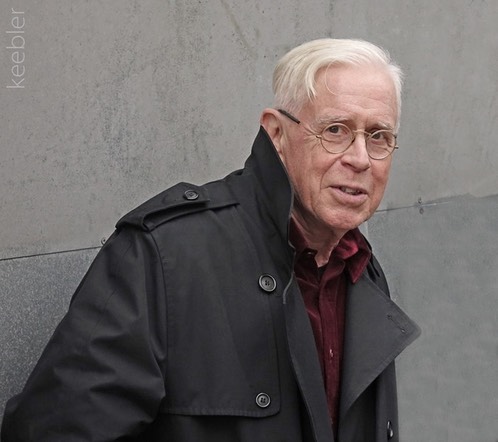
April 18, 2020
JerryJazzMusician
Bruce Cockburn: Life during isolation and social distancing
In recent days, I have posed this question via email to a handful of creative artists and citizens of note:
“During this time of social and isolation at home, what are examples of the music you are listening to, the books you are reading, and/or the television or films you are viewing?” (If you wish, please feel free to also share your thoughts on the effects this isolation is having on your creativity or on your world).
This edition features the email response of recording artist Bruce Cockburn.
You might think, in this time of isolation, that there would be an opportunity for catching up on all sorts of things: household tasks that we’ve been putting off, books waiting to be read, etc, but for me the reality is that with my wife teleworking and my 8-year-old “teleschooling” and having ZOOM play dates, and all of us together 24/7, I’m quite a lot busier than what used to be normal. That said, I have been listening and reading: Fernando Pessoa’s novel The Book of Disquiet, William Gibson’s Agency, poetry by Charles Bukowski, Joan Logghe and Wislawa Szymborska. For music, it’s pretty random. Recent listens include YouTube videos of David Russell’s stunning guitar playing as well as various performances by Voces8, Charles Mingus’ Tijuana Moods (an old favorite), the Rolling Stones’ Exile on Main Street, and Schoenberg’s Verklarte Nacht..I haven’t watched any TV. That’s something I mostly do in hotel rooms. My daughter and I watched the second Smurfs movie the other day, which I love!
We are lucky in that my wife is still working. I feel for the baristas and waiters and cab drivers and everyone who depends on being able to move around and congregate for work. There’s an undercurrent of worry we all feel. My daughter feels some stress that gives her trouble getting to sleep sometimes. I feel somewhat fatalistic about COVID-19 with respect to myself.
I suppose each of us has to find whatever ways we can to put our “house arrest” to good use, even if it’s only resting, which a lot of us probably need. After a month, it still feels like a novelty. The challenge of coming up with creative ideas of how to pass the time, maintain friendships and acquire toilet paper is still kind of entertaining in itself. I’m not sure that will remain true if we have to live like this for too long.
April 7, 2020
Toronto Globe & Mail
Moment In Time
by Brad Wheeler
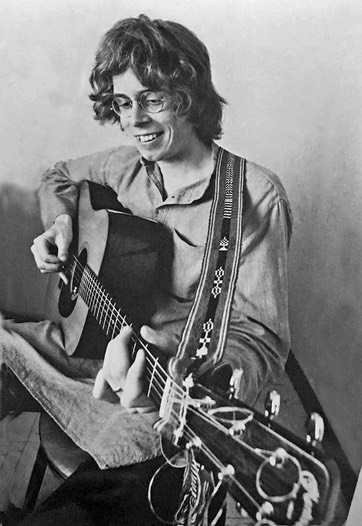
The turn of the sixties into the seventies was a time of thoughtfulness and patchouli-scented spirituality, reflected by charting hits that included, in the spring of 1970, Simon & Garfunkel’s Bridge Over Troubled Water and the Beatles’ Let it Be. “Speaking words of wisdom,” then, was something of a genre unto itself. It was in this era that on April 7, 1970, the young Ottawan Bruce Cockburn released a spare, acoustic and introspective self-titled debut album that was at turns gentle and jaunty, marked by flowery lyricism and the lucid, seeking outlook of a self-aware artist on the cusp of something yet unclear. “It’s my turn, but where’s the guide?” the nascent troubadour wondered on Man of a Thousand Faces. The political activism of 1984′s If I Had a Rocket Launcher would come later, as would 13 Juno Awards. In 1970, though, with songs such as Thoughts on a Rainy Afternoon, the gifted musician sought connections behind the things he observed. As for what lay ahead, he was characteristically clear-eyed, singing “Jesus, don’t let tomorrow take my love away.” Cockburn would win that fight.
March 21, 2020
Via email from Bruce
Bruce out for a walk in San Francisco at Tank Hill Park on March 20, 2020.
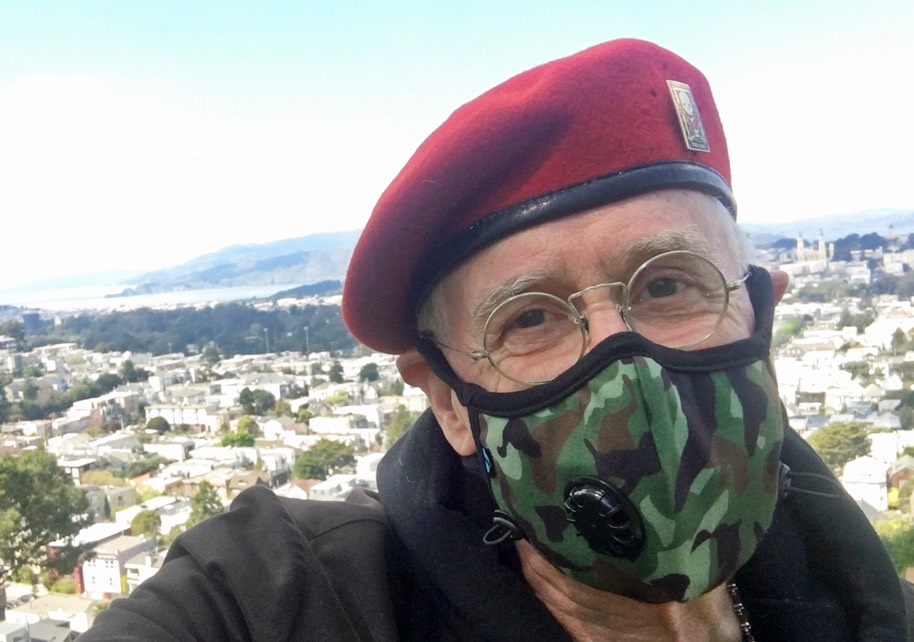
February 3, 2020
True North Press Release
Bruce Cockburn Announces 50th Anniversary Shows.
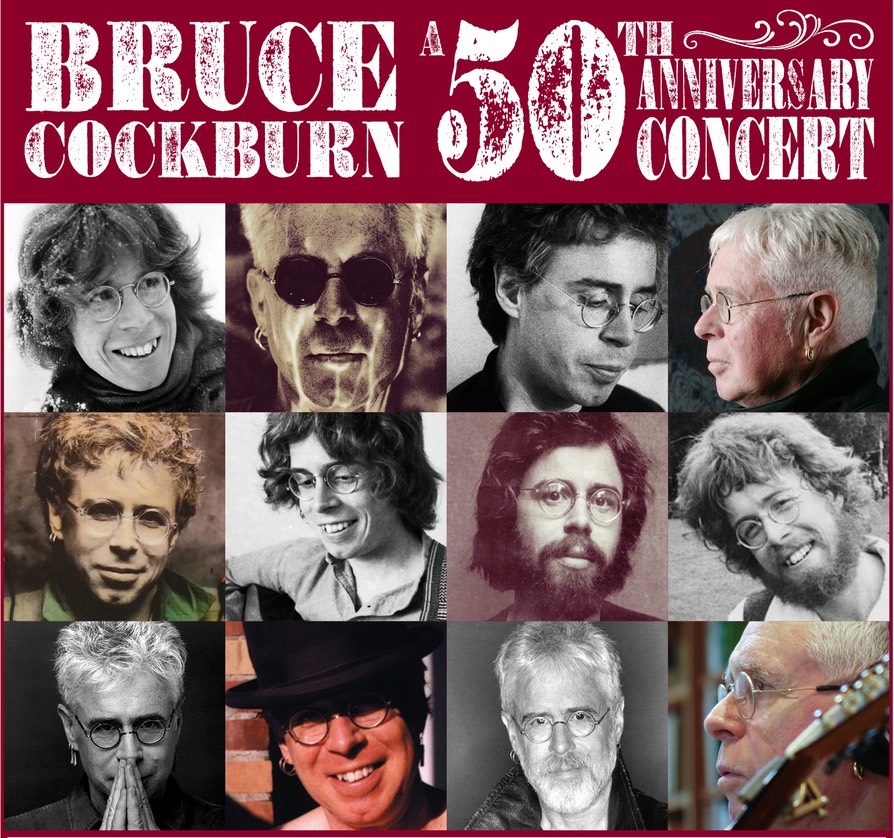
Is it really fifty years ago that Bruce Cockburn’s first album came out?
Indeed, it is. His eponymous titled album which included “Going To The Country” and “Musical Friends” was released on April 7, 1970. Coincidently it was also the first album released by True North records. TN 1 was its catalogue number.
Although mostly recorded in late 1969 the first album hit the stores and airwaves in 1970 and started the long, long journey that continues to this day.
Here’s what Bruce has to say:
“In 1969, when I was feeling the need to record an album of the songs I’d been writing, I had no concept of what that might lead to. Not unusual for a young person, I guess. In some organic way it felt like it was time. The future wasn’t really an issue. It still isn’t. For each of us, there’s a future or there isn’t. But looking back over the arc of fifty years of recording, performing, and travel, not to mention relationships and personal challenges, I can only shake my head and mutter a word of thanks for all of it. Even if I’d been a planner by nature, I doubt I could have predicted how things have gone. And they’re still going!”
Bruce has now released 34 albums and played thousands of concerts around the world, something that he continues to do to this day.